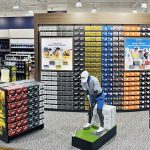At the 2022 NRF Big Show, Roberto Funari, CEO, Alpargatas, the Brazilian parent of Havaianas sandals, and Giorgio Pradi, president, Sunglass Hut North America, said that with the big shift toward digital stemming from the pandemic, stores have become more important tools to acquire and engage customers.
“It’s a dramatic shift driven by these digital-enabled consumer shoppers,” said Funari. “It is basically at the core of this big change in the last two, three years.”
He said the digital shift has had a big impact on what consumers expect from brands and their preferences. Funari added, “We increasingly see that expectations, particularly when you go to a physical retail location, are that you have much more than the act of buying or shopping. Consumers want much more than entertainment. They want service. They want convenience, but, even more importantly, they want to see if this brand ‘knows me.’ They want to see how they’re part of the communities that these brands represent.”
Funari said heightened demand for more personalization had driven a “dramatic shift in the way that companies treat data because data now needs to go beyond analytics and drive much more deeper insights.”
Funari also said the heightened demand for personalization had led to significant changes in merchandising and staff training to elevate the in-store experience. Funari said, “And for us that operate in smaller stores, that’s a dramatic challenge. How do we pack all of these expectations at 50-to-100 square meters?”
Funari said Havaianas looks to open stores in “summer destinations,” representing both beach and urban settings. The brand has in excess of 500 mono-brand stores. He added, “Havaianas sells freedom of expression but also the inner feeling of liberation. And we use the Brazilian summer, the summer spirits, that we have in Brazil as a point of difference.”
Pradi said Sunglass Hut saw low traffic but high conversion as stores opened after closures early in the pandemic with traffic returning to pre-COVID levels last year. One tool that has been strongly accepted has been its Smart Shopper, which enables shoppers in the store an easy path to purchase more extensive or “Endless Aisle” offerings online that are not available in-store. Pradi said Smart Shopper now accounts for 12 percent of all in-store sales versus 2 percent prior to the pandemic.
Sunglass Hut is owned by EssilorLuxottica, formed in the mega-merger with Luxottica. Luxottica is responsible for driving Sunglass Hut’s expansion to 18,000 shops worldwide.
Pradi credited Leonardo Del Vecchio, the late founder of Luxottica, for why EssilorLuxottica prioritizes direct-to-consumer. The shift emphasizes a direct-to-consumer presence after Luxottica acquired the 800-unit Lens Crafters chain near the end of the 20th century.
Praid said Del Vecchio saw benefits in having access to data to support its eyewear business and to support production planning with factories. He added, “It’s also about understanding customer preferences and needs better to allow us to anticipate future trends. This has given us a huge advantage versus a competitor.”
Finally, he said Del Vecchio wanted to own stores because Luxottica could better train retail staff internally to elevate the customer experience with Luxottica’s wide range of brands, which includes Oakley, Rayban and numerous designer brands. Said Pradi, “He wanted to explain to the customer the best characteristic of the product and truly get them engaged and connected.”
Pradi said Sunglass Hut focuses on delivering consistent experiences across its stores since many of its locations are in tourist destinations. He added, “We want the customer to see the same experience in stores.”
He added, “It is important that whenever you’re working with hundreds of stores, it’s a fun experience, a great environment and an associate welcomes you with a smile.”
A foremost priority for Sunglass Hut is recruiting. He said, “We want our associates to be passionate about the product and love the interaction that happens with the customers.” Training and establishing a strong culture at each store are also essential.
Funari said Alpargatas, in 2021, acquired a digital transformation company, Oasis, with operations based in Brazil, but with global reach, to better leverage access to consumer data. Said Funari, “Today, we use consumer data to support decisions we make in store expansion, store operations and so forth.”
Alpargatas is also making a “massive investment” with its in-store employees. Said Funari, “The face-to-face human contact interaction at the physical store is one of the most important competitive advantages you have.”
Asked how they envision the store of the future, Funari said, “Being fully digitally enabled is fundamental in the future. The physical experience will be even more relevant, both in terms of offering services, but also offering brand engagement, hyper-connectivity and desirability. We see the store as a fundamental pillar for this to happen. And then you need to segment the stores so that not every store looks the same not only for localization reasons but for the different experiences that are expected.
He added, “I think we enjoyed a period where we could standardize and drive efficiency, rather than driving all the experience at the same time. We see tremendous pressure in making this work for the bottom line.”
Pradi said, “On the one side, we can’t stop the evolution of e-commerce. On the other, physical stores represent an important pillar in the global experience. Companies that are performing better and will win in the future are the ones that invest in more integration within the two channels, the digital and the physical, to give the customer a seamless experience across every channel.”
He added, “The key is understanding what the customer expectation is on their journey between the digital and the physical store. The customer’s journey now often starts on the website. The stores will be doing more to elevate the experience and be where the customer gets engaged and becomes passionate about the brand. We used to say at Sunglass Hut, ‘We don’t sell sunglasses, we sell feeling good.’ I think that’s key. The customer doesn’t just come to us to buy a product, they come for the experience we give to them.”
Photo courtesy Luxottica
















